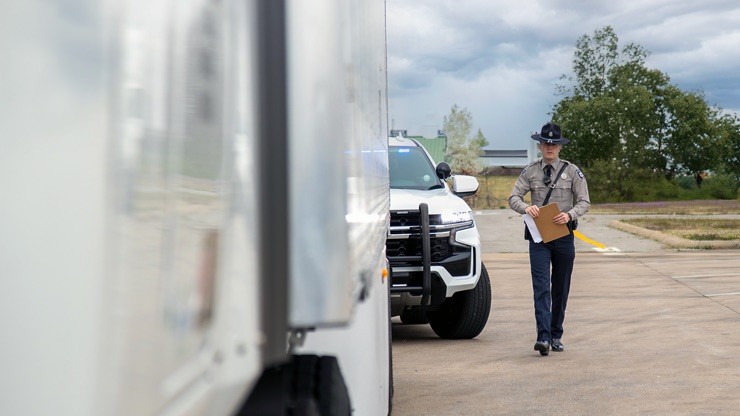Theft Prevention Tips for Carriers

You have likely heard that cargo theft is on the rise. Cargo theft incidents in 2023 were up more than 57% compared to 2022, according to CargoNet. Nearly $130 million worth of goods were stolen last year. And now you don’t just have to worry about cargo being stolen while parked – strategic cargo theft is becoming a problem, too.
Strategic cargo theft is theft by using fraud and deceptive information to trick shippers, brokers and carriers into giving freight to bad actors. For example, let’s say someone steals a legitimate broker’s identity. They could then get freight from shippers and hire a legitimate carrier to unknowingly misdirect freight from its intended destination so they can steal it. People can also use online load boards to post fake loads to get the information they need to steal a carrier’s identity. This means that the physical security of the cargo and cybersecurity is critical when it comes to asset protection.
Stolen loads also have a major impact on carriers’ bottom lines. Carriers do not get paid if a load is stolen. Keep reading to learn ways to improve cargo security while on the road and online.
Cargo Theft Prevention Best Practices:
- Thoroughly vet brokers. Conduct a thorough background check before working with a broker to verify their legitimacy and reputation in the industry. Look for reviews and feedback from other carriers to gauge their reliability. Ensure brokers have the licenses, permits and certifications needed to operate legally. Check their credentials with relevant authorities or industry organizations.
- Secure communication. Use secure communication channels to exchange sensitive information with brokers and shippers. Avoid sharing critical data through unsecured channels like email or text messages.
- Confirm load details. Always verify load details, including pickup and delivery locations, directly with the broker and shipper.
- Use load boards safely. When using load boards or online freight marketplaces, exercise caution and research the reputation of brokers and shippers before accepting loads.
- Get cargo insurance. Carry adequate cargo insurance to protect against potential losses due to theft or damage during transit.
- Use real-time tracking. Utilize GPS tracking systems to monitor the location of the truck and trailer in real time.
- Find secure parking. Encourage drivers to park in secure, well-lit areas with surveillance cameras during rest breaks or overnight stops. Avoid parking in high-risk or isolated locations.
- Educate drivers. Train drivers to be vigilant about potential fraudulent pickup attempts and verify load details before accepting shipments.
- Prevent identity theft. Protect sensitive company information and employee data through robust cybersecurity measures. Use secure passwords, regularly update systems and educate employees about phishing scams.
- Stay informed. Keep abreast of the latest tactics used in load theft and identity theft to be prepared for potential threats.
- Collaborate with law enforcement. Work closely with law enforcement agencies to share information about cargo theft incidents. Encourage drivers and employees to report any suspicious activities, such as fraudulent pickup attempts or identity theft, to management immediately.
People You Trust
When it comes to cargo theft prevention, working with reputable transportation and logistics companies is key. With more than 60 years in business, J.B. Hunt has the people you trust to conduct business with.
Sign up for Carrier 360 to find your next load today!

